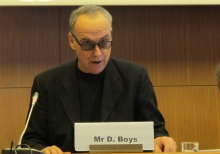PSI stresses the failures of PPPs at UN World Water Day event

by Sonia Sanchez
Under the theme ‘Water and Jobs’, this year’s World Water Day focused on the vital role water plays in creating and supporting good quality jobs. For PSI, however, the reliance on Public-Private Partnerships (PPPs) and private finance to meet the core obligations of governments, as it is being currently suggested by the UN, is not welcome.
“We are witnessing a coordinated global push for an environment which will enable almost all public services to be turned over to the market […] and the market dynamics are such that market actors must maximize profits, reduce risks and guarantee returns”, said David Boys, PSI Deputy General Secretary.
“This doesn’t work in the water sector, not when you have to ensure universal access, regardless of ability to pay, not when you have a natural monopoly position and ‘clients’ who must buy your product on a daily basis. Not when you also have to protect the ecosystem”, he added.
Boys noted that PSI welcomes the Sustainable Development Goal (SDG) #6 and all the preceding UN resolutions that more clearly identify the human rights to water and sanitation services.
In regard to this matter, the 2016 edition of the World Water Development Report, highlighting the two-way relationship between SDG #6 covering water and sanitation for all and SDG #8 addressing decent work for all, was launched during the event. The report illustrates how the connection between water and jobs holds the promise of inclusive and sustainable economic growth for all countries.
In order to build an enabling environment for strong public water and sanitation services, the PSI Deputy General Secretary suggested that some steps should be taken: there is a need for global tax justice; a decentralisation of responsibility that must come with the funds; decent work conditions for all workers; effective local government, with participatory mechanisms, and with adequate staff, skills, training and tools; and an environment to enable Public-Public Partnerships (PuPs) between strong and weak public utilities, to build capacity and exchange experiences.
Besides Boys, the opening panel was also composed of Guy Ryder, ILO Director-General and Chair of UN-Water; Flavia Schlegel, Assistant Director General for Natural Sciences, United Nations Educational, Scientific and Cultural Organization; H. E. Misako Kaji, Chairperson of the ILO Governing Body and Kamran Rahman, IOE Regional Vice President for Asia and Governing Body Employer member, Bangladesh.
1.5 billion workers
Guy Ryder said that the availability and sustainable management of water has a clear and direct link with the creation of quality jobs. He highlighted the situation of almost half of the of the world’s workers, some 1.5 billion people, who work in water-related sectors. Many of these workers are not recognized for the work they do, nor protected by basic labour rights. “This needs to change”, said Ryder who called for improved conditions for water workers.
The Chair of UN-Water also stressed that if the 2030 UN Sustainable Development Agenda is to be a success and that we are to build together a sustainable future, we must ensure that work in water is decent and that the water we all rely on is safe. He added as well that the quality and the quantity of water has a direct impact on workers lives and health.
Video
More information:
- PSI statement for World Water Day: Water and Sanitation are Human Rights, NOW!
- PSI pages on Water & Sanitation

